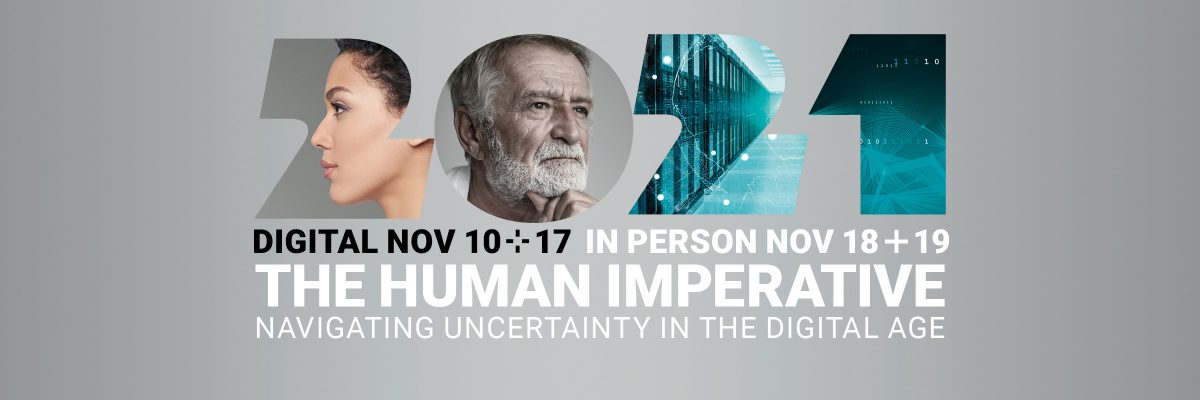
Parallel plenary #4, 21 November 2019: Capitalizing on new technology and connectivity
‘How can we capitalize on new technology and connectivity?’. When the writer read the announcement of the panel chaired by Mehran Gul, he expected the discussions to center on technology and the buzzwords of the day – ‘Artificial Intelligence (AI)’, the ‘internet of everything’ or at the very least ‘Collaboration Platforms’ …
Fortunately this was not the case. The paradox of ‘capitalizing on new technology’ is that technology shows every sign of being the wrong focus. The miracle occurs beyond technology, with a clear focus on innovation and people. Panelists Adam Cheyer, Karenann Terrell, Carsten Linz, Claudia Crummenerl and Amit Bajaj provided a broad range of perspectives, but all focused on dimensions ‘beyond technology’. Two of them, Carsten Linz and Claudia Crummenerl, focused their message very explicitly on this perspective shift.
Drucker Forum 2019
It’s innovation, stupid!
Carsten Linz, Group Digital Officer of BASF SE, was clear about what really matters for success in ecosystems, focusing on ‘innovation-led transformation’: meaning, don’t digitize the past, innovate for the future. Concentrating on technology-led efficiency and optimizing the status quo only is the wrong way to capitalize on new technology and may even threaten an organisation’s future viability.
But how can innovation-led transformation be brought about in ecosystems? Linz’s message was: ‘You should expose what you can do best that others can use to co-create the future with you’. Taking AI as another example for a ‘beyond technology’ perspective, he made it clear that where data and algorithms are king, then moral and ethical integrity must be queen. The full value of data and algorithms cannot be harvested without an innovation-led framework for ecosystems focusing on the needs of people and organizations.
It’s people, stupid!
Claudia Crummenerl, Global Vice-President for People and Organization at Capgemini Invent, deepened this second central aspect of going ‘beyond technology’. It‘s people, stupid!
‘When we start looking at how to deliver outcomes from digital transformation, we see that it is actually not a technology problem but a people and organizational capability issue,’ she said.
Echoing Linz, Crummenerl differentiated two reasons for digital transformation: cost-cutting and identifying opportunities for growth. To be successful, any initiative must combine both. As for success factors in realising the miracle of turning growth opportunities into reality, she emphasized that consistency and continuity of strategic direction were key – it is impossible to capitalize on the opportunities that technology brings through the single-minded pursuit of short-term benefits.
The bigger pictures: inter- and intra-enterprise collaboration, culture …
The focus on innovation and people in ecosystems has an impact on the larger context, for example, on inter-company collaboration, culture and even governance. Based on his own experience, Adam Cheyer, co-founder and VP Engineering, Viv Labs (and previously Siri, before it was acquired by Apple), examined, among other things, the pitfalls and opportunities for collaboration between start-ups and companies and how to balance internal and external innovation, integration and autonomy. In his introduction, he called for a clear decoupling of start-ups from the complexity of companies. The sovereignty of the start-ups and the documentation and APIs for decoupling will be a critical part of success. When Bajaj, Crummenerl and others spoke of collaboration within internal ecosystems, they evoked the relevance of platforms, data and integration, but other aspects, such as culture, were again at least of equal importance in moving beyond the silos of our existing companies.
Dark sides of ecosystem collaboration
After the panel presentations, the audience added some important extra elements to the discussion, particularly on the darker sides of ecosystem companies, and the necessity of distinguishing the ‘fake’ from the ‘real’ ones. While the fake ones call themselves ecosystem-oriented, they focus mainly on its exploitation.
We should not be naive about ecosystems. We need a clear focus on win-win strategies, unambiguous ecosystem governance and transparency to ensure that ecosystems fulfill their promise of capitalizing on new technologies and connectivity for the benefit of all participants. While the audience and panelists added many other valuable insights and experiences, they served above all to confirm the central ‘beyond technology’ message of the session: innovation should be the ‘North Star’ for capitalizing on technology within ecosystems, with a strong focus on people and appropriate organization and management concepts as keys to ultimate ecosystem success.
This article is one in the Drucker Forum “shape the debate” series relating to the 11th Global Peter Drucker Forum, under the theme “The Power of Ecosystems”, taking place on November 21-22, 2019 in Vienna, Austria #GPDF19 #ecosystems
#GPDFrapporteur


really wonderful article, thanks for sharing such a piece of great knowledge.